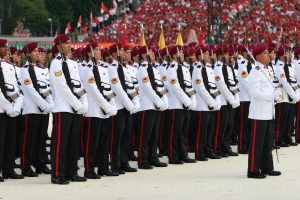Early this month, the Singapore government reaffirmed its intention to revamp the military’s capabilities and capacities in line with evolving and emerging threats. As part of “SAF 2040,” the city-state’s vision for its armed forces that will take shape by 2040, Singapore is setting up a new wing of its armed forces dedicated to digital security, aptly named the Digital and Intelligence Service (DIS). Coupled with the other three domains (land, air, and sea), Singapore is aiming to develop an efficient and modernized military that can minimize its vulnerabilities and maximize its strengths. Overall, it is doing this in the hope that the country can secure its territory independently and protect its centre of gravity, which is arguably the people of Singapore.
Defense Minister Dr. Ng Eng Hen has affirmed the importance of setting up the new digital service, citing the Russia-Ukraine war, which has included cyberattacks. Addressing Parliament on March 2 during the Committee of Supply debates through which the legislature approves the proposed budget for the next financial year, he said the Singapore Armed Forces (SAF) would establish a “fourth service,” meant to integrate and expand the republic’s capabilities in the digital domain. “As good and as ambitious as the next generation SAF is,” he said, “there are some gaps and capabilities, which recent events and developments warned us against.”
In this instance, Ng was likely alluding to the threats in the digital domain, of which Singapore has experienced its fair share. The most notable example was a cyber-attack in 2018 targeting the country’s biggest public healthcare group. This led to a data breach that exposed 1.5 million patients’ personal information, including that of a prominent public figure. According to Ng, the new military cyber service will be set up by the last quarter of 2022 and should help Singapore “deal effectively with digital threats from external aggressors that we expect will grow in numbers, sophistication and organization.” The DIS will ultimately be a consolidation of the SAF’s Command, Control, Communications, Computers, and Intelligence (C4I) unit, which was established in 2012.
As part of the vision for 2040, Singapore has disclosed several procurement and upgrade programs that the country has undertaken or will be undertaking in the next few years. An image published on the Defense Ministry’s website shows a series of advanced weapons that will likely be inducted into the respective services by the proposed time horizon. To ensure sustained progression, the Singaporean government proposed a defense budget of estimated SGD 16.36 billion ($12 billion) for 2022, an increase of 6.5 percent over the allocation in 2021.
Weapons recently procured include the Orbiter 4 Close-Range UAV, which is manufactured by the Israel-based drone specialist Aeronautics Limited. This is aimed at enhancing the SAF’s ground situational awareness. According to the Ministry of Defense, the Orbiter 4 can be employed independently or collaboratively with the SAF’s existing fleet of larger UAVs for scanning of the battlefield from different altitudes, providing both a bird’s eye view of the battlefield from a higher altitude and conducting in-depth surveillance of specific areas from a lower altitude.
Of course, it remains to be seen how Singapore will be able to integrate DIS with its other traditional services. Future bilateral or multilateral military exercises with strategic partners such as the USA would help illuminate this process.

































